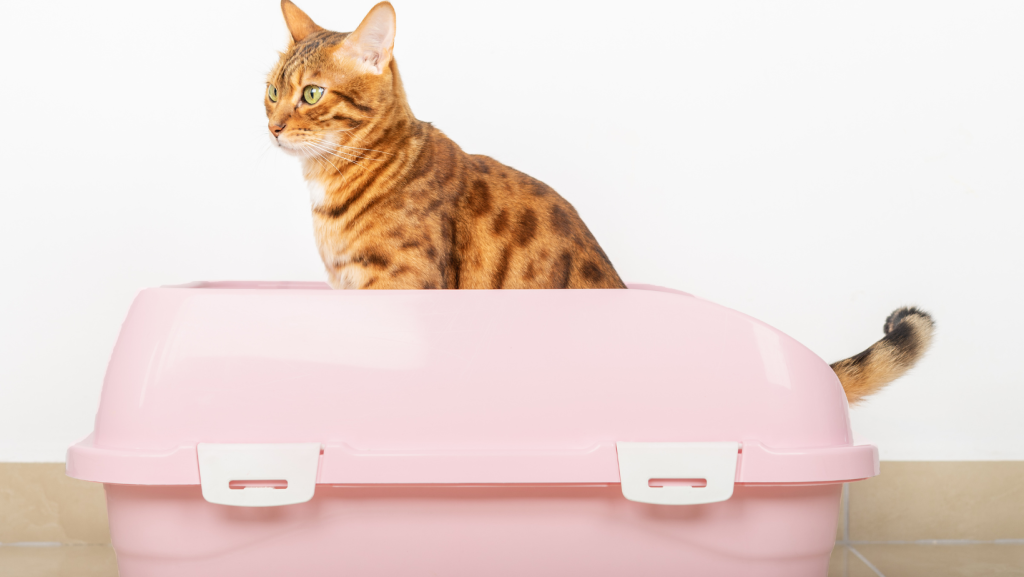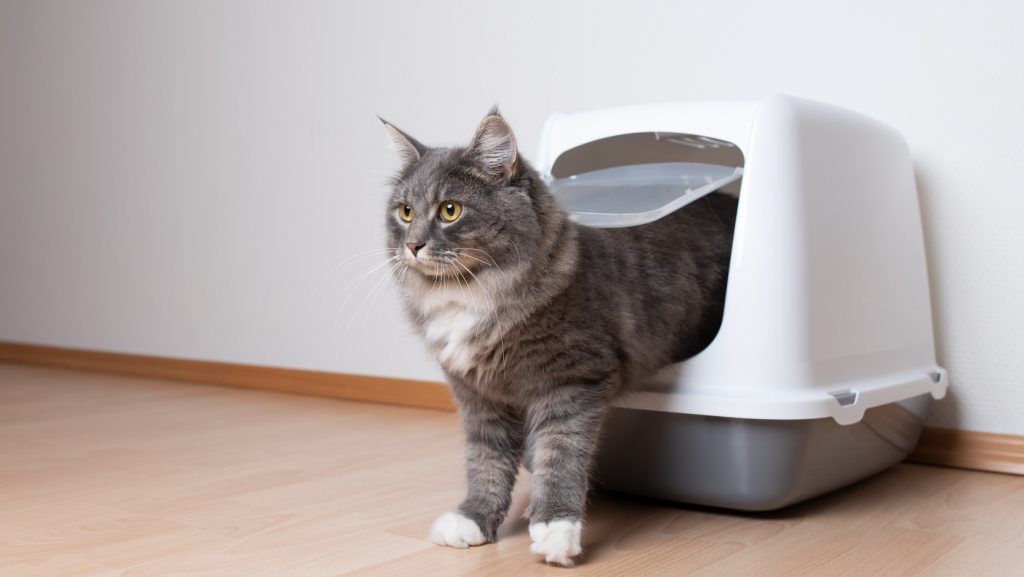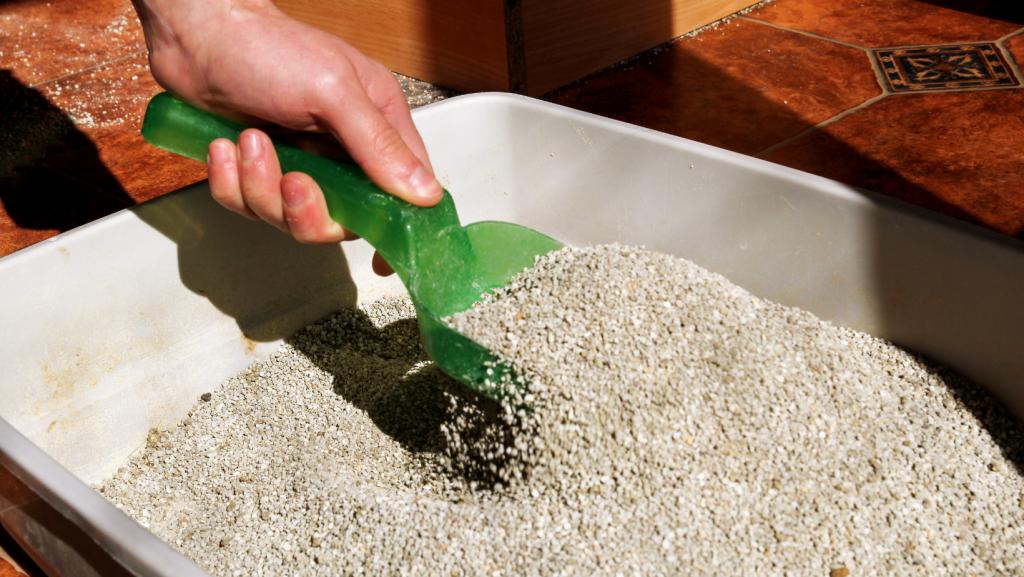Urinary tract diseases in cats can be a serious and worrying problem for cat owners. One common symptom of this condition is when a cat or tomcat urinates blood. This can be a sign of various underlying problems, including urinary tract infections, bladder stones, or even more serious conditions such as kidney disease or cancer.
Only by understanding the underlying causes of why your cat is urinating blood or blood-tinged urine will you be able to properly care for your furry friend.
Table of contents
My cat is urinating blood or blood-tinged urine. What could be the causes?
When a cat urinates blood, it is a sign that something is wrong with its urinary tract. This may be the result of inflammation or irritation of the bladder or urethra, which can cause bleeding. Infections, stones, or tumors can also cause a cat to urinate blood. It is important to monitor changes in the color or consistency of your cat’s urine, as this may indicate potential health problems.
Without examining the animal, veterinarians can list several reasons why a cat may be urinating blood or blood-tinged urine. The most common medical causes are as follows:
1. Urinary tract infections (UTIs): UTIs are a common cause of blood in a cat’s urine. Bacteria can enter the urinary tract and cause inflammation and infection, causing the cat to urinate blood.
2. Bladder stones: In some cases, cats can develop bladder stones or crystals, which can irritate the bladder lining and cause bleeding, resulting in the cat urinating blood—pink or red. Crystals can also cause other symptoms: cats lick their stomachs and urinate frequently in small amounts.
3. Lower urinary tract disease in cats. This is a common condition in cats that can cause them to urinate blood. This condition is often associated with stress, diet, colds, and other factors.
4. Kidney disease. Kidney disease can also cause a cat to urinate blood – reddish or red. Because the kidneys have difficulty functioning properly, they may not be able to filter and perform their functions effectively, resulting in blood and blood clots in the urine. Frequent urination in large amounts in cats may also be due to kidney disease.
5. Trauma. Due to injuries to the urinary tract, such as a fall or accident, cats may urinate blood or blood impurities. Trauma can also completely disrupt urination, so it is always necessary to consult a veterinarian who can diagnose the problem in a timely manner and prescribe the most appropriate treatment.

If a cat is urinating blood, how can we help it?
It is essential to treat a cat’s bloody urine. This can only be done accurately by a veterinarian after examining the animal and performing blood and urine tests. In addition, depending on the specific disorder, an X-ray and ultrasound of the abdominal area may also be necessary.
If you notice that your cat is urinating blood or blood-tinged urine, or if your cat is urinating frequently, it is important to contact your veterinarian as soon as possible so that a proper diagnosis can be made and a treatment plan can be prescribed as soon as possible, because every minute is crucial for cats suffering from urinary tract diseases.
If your cat has started urinating blood, it is important to consult a veterinarian as soon as possible. A thorough examination and diagnostic tests may be necessary to determine the underlying cause of the blood. Depending on the diagnosis, treatment options can range from antibiotics for infections to surgical removal of bladder stones.

What is the treatment for blood in a cat’s urine?
In most cases, veterinarians perform the necessary tests and prescribe a multi-step treatment plan, which may include:
1. Antibiotics and anti-inflammatory drugs: If the cause is a bacterial infection, your veterinarian may prescribe antibiotics to help eliminate the source of the infection. If your cat is urinating blood or blood-tinged urine due to a viral infection, your veterinarian may prescribe anti-inflammatory drugs to reduce the inflammation. If your cat has been urinating blood for a long time, both types of medication may be necessary to fully cure the animal.
2. Dietary changes: In some cases, dietary changes can help prevent bladder stones, crystal formation, and other conditions that cause cats to urinate blood.
3. Fluid therapy: If your cat is dehydrated due to impaired urine output, it may need to be given extra fluids.
4. Stress management: if you notice that your cat is urinating frequently, it may be due to stress. Unfortunately, stress has a significant impact on immunity, so any stressor can weaken your cat’s response to any infection. In this case, to reduce the chance of a secondary infection due to the primary urinary tract infection, your veterinarian may recommend strategies to help reduce stress in your cat’s environment.
5. Surgery: In some cases, surgery may be necessary to remove bladder stones or other obstructions causing bloody urine.
It is important to monitor your cat’s urine regularly and consult a veterinarian if you notice any changes. This is especially important if you notice that your cat is urinating frequently or passing blood in its urine. With timely help, proper treatment, and care, most cats that urinate blood can recover and enjoy a happy and fulfilling life, bringing joy to their owners.

How to protect yourself from cats urinating blood or blood-tinged urine?
Veterinarians at the Begemotas Veterinary Clinic in Vilnius remind us that, in addition to medical treatment, if your cat has no health problems, there are steps you can take at home to keep your cat’s urinary tract healthy:
- A steady and unlimited supply of fresh water, exercise, and a balanced diet can help prevent urinary problems.
- In addition, keeping the litter box clean can help improve the condition of the urinary system and prevent bacterial infections.
Why does my cat urinate frequently, and what should I do?
There are several reasons why your cat may be urinating frequently. Two of the most common causes are urinary tract infections and urinary tract stones, which can cause pain and discomfort for your cat, prompting them to urinate frequently to relieve the discomfort.
Other possible reasons for frequent urination in cats include more serious illnesses:
- Such as diabetes in cats.
- Kidney failure in cats.
- Idiopathic cystitis in cats – a condition that causes inflammation of the bladder.
If you notice that your cat is urinating frequently or differently than usual, it is important to take them to the vet in time for a thorough examination. The veterinarian will be able to determine the underlying cause of your cat’s frequent urination and prescribe appropriate medication to relieve the symptoms and improve your cat’s quality of life.
In addition, to prevent frequent urination in cats, it is very important to make sure that your cat always has access to fresh, clean water and eats a balanced diet that can help maintain a healthy urinary system.
Also, if your cat’s frequent urination is related to stress or changes in its living environment, creating a comfortable and stress-free environment for your cat can reduce its urge to urinate frequently. If your cat likes to play and exercise, give it more attention and mental and physical stimulation to reduce stress levels and improve its overall well-being.

Where to seek help?
At the Begemotas Veterinary Clinic, your pet will receive comprehensive care, undergo all necessary tests, and be prescribed appropriate treatment. The specialists working at Begemotas will not only provide you, as owners, with all the necessary information about the disease, the necessary tests, the course of treatment, and home care, but will also provide emotional support and save you time by performing all tests and treatment under one roof.
If you notice your cat urinating blood, don’t delay and register now at +37067795077.





